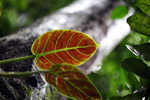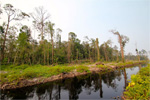
Natural forest that has been cleared by PT Triomas FDI on the Kampar Peninsula. All that remains are young ramin trees. The rest of the timber was transported to APRIL’s pulp mills in Pangkalan Kerinci. Location GPS: N 0 33′ 49.600″ E 102 56′ 48.180″. Courtesy of Eyes on the Forest.
Plantation giant Asia Pacific Resources International Limited (APRIL) continued to source fiber produced by destruction of high conservation value forests in Sumatra right up until it committed to a new forest conservation policy, according to an investigation by Eyes of the Forest, a coalition of environmental groups in Riau.
Eyes of the Forest looked at operations of PT Triomas Forestry Development Indonesia (FDI), a pulpwood supplier for Asia Pacific Resources International Limited (APRIL) and its parent conglomerate Royal
Golden Eagle (RGE). It found evidence suggesting that Triomas cleared areas classified by APRIL as high conservation value (HCVF) through at least December 2013 on the Kampar Peninsula.
Eyes of the Forest said that not only did Triomas clear protected ramin trees, the company attempted to conceal evidence by burying the contraband logs after a local NGO exposed the activity.
The new report comes less than three months after APRIL announced it has suspended clearing of natural forests that have yet to undergo conservation assessments. APRIL also said it would commit to restoring 40,000 hectares of forest.
APRIL’s policy came in response to years of criticism from environmental groups over its forest management practices, which include large-scale conversion of wildlife-rich rainforests and carbon-dense peatlands for industrial timber plantations as well as ongoing conflicts with local communities.
Nonetheless APRIL is still viewed by environmentalists as a laggard compared to its larger rival, Asia Pulp & Paper (APP), which established what is widely considered a stricter forest conservation policy in February 2013. APP’s policy commits it to protecting high carbon stock and high conservation value forest, while seeking free, prior informed consent from local communities in new plantation development.
Like APRIL, APP had been long targeted by NGO’s for its environmental record.
CITATION: Eyes on the Forest. APRIL clears high conservation value forest in Sumatra’s Kampar Peninsula, as it breaks its own commitment. April 2014
Related articles
Is deforestation-free clothing possible?

(04/02/2014) H&M and Zara/Inditex, two of the world’s largest clothing companies, today pledged to eliminate old-growth forest destruction from their products. The commitment lends support to a new front on efforts to cut deforestation out of the supply chains of global brands. Until now, most of the focus of campaigners has been on pulp and paper, timber, and agricultural commodities like soy, palm oil, and cattle.
Community’s push to clear forest for plantation challenges efforts to conserve in Indonesia

(03/20/2014) In the swampy peatlands of Basilam Baru in Sumatra’s Riau Province a conflict between a community and a woodpulp company is illustrating some of the intractable challenges of conserving forests and addressing deforestation in Indonesia. On first glance the story seems depressingly familiar. One actor wants to preserve the forest, which serves as critical habitat for endangered Sumatran tigers and clouded leopards. The other wants to clear it for a plantation.
Community’s push to clear forest for plantation challenges efforts to conserve in Indonesia

(03/20/2014) In the swampy peatlands of Basilam Baru in Sumatra’s Riau Province a conflict between a community and a woodpulp company is illustrating some of the intractable challenges of conserving forests and addressing deforestation in Indonesia. On first glance the story seems depressingly familiar. One actor wants to preserve the forest, which serves as critical habitat for endangered Sumatran tigers and clouded leopards. The other wants to clear it for a plantation.







